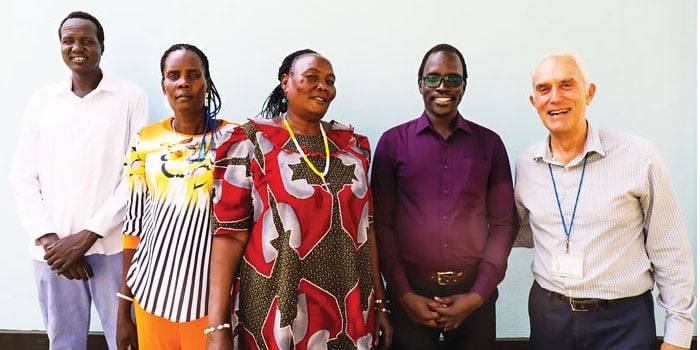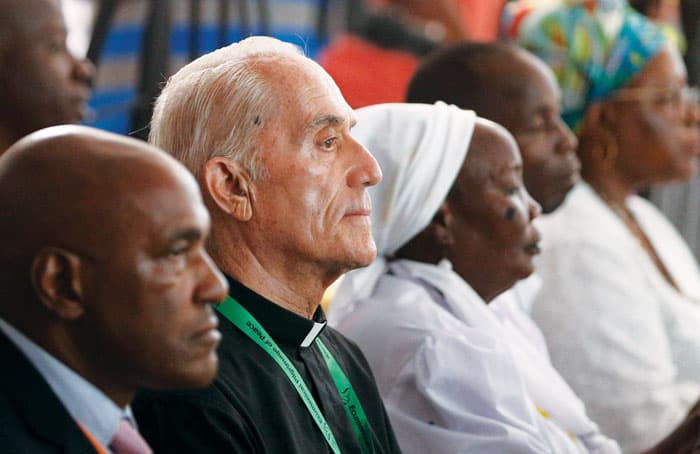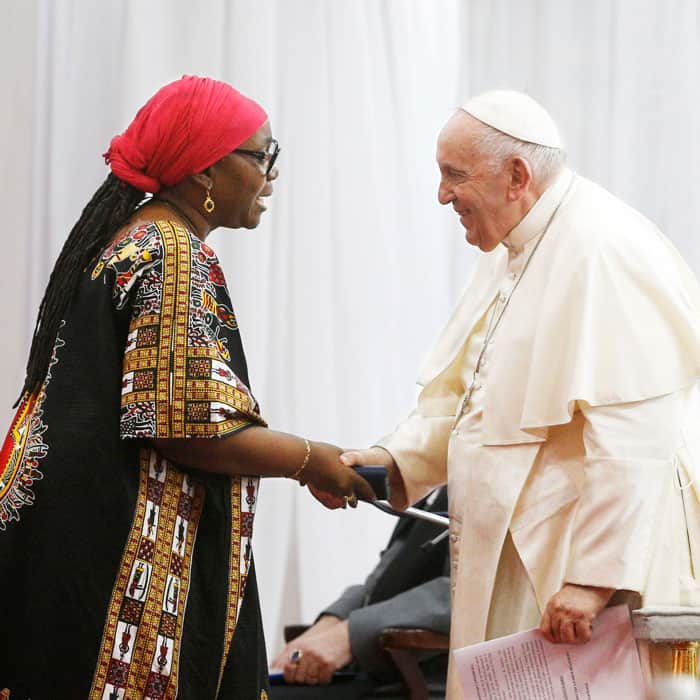Maryknoll Father Michael Bassano accompanies those displaced by war in South Sudan to meet with the visiting pontiff.
Words cannot adequately express what a memorable experience it was to see Pope Francis during his Ecumenical Pilgrimage of Peace.
It began on Friday morning, Feb. 3, when I went to the Juba airport to greet the 50 internally displaced people (IDPs) invited to participate in the papal visit to South Sudan.
Since I live and work in an IDP camp outside the city of Malakal, I was part of the team to welcome the delegation of 25 people from the Malakal camp and 25 people from the camp in Bentiu. We then chose four of them to participate in an interview with a staff member of the United Nations High Commissioner for Refugees (UNHCR) office. The four men and women, Thai and Elizabeth from the Bentiu Camp and Jokino and Teresa from the Malakal camp, spoke from the heart about the reality of living in the camps and their hopes for the future.
The next morning, there was a meeting with Pope Francis at St. Theresa’s Cathedral for all bishops, priests and religious sister and brothers. Sitting near the end of my pew, I was able to catch a glimpse of the pope as he came down the main aisle in a wheelchair. His message to all of us gathered there was to be prophetic in our search for justice and peace in South Sudan. He called for an end to the senseless bloodshed of war and asked us to be prophets of peace. Referring to the Biblical figure of Moses, he said that we, too, must help people out of suffering toward a new life of hope and peace.

Maryknoll Father Michael Bassano (far right) is shown with IDPs chosen to be interviewed and to greet Pope Francis: (left to right) Thai and Elizabeth from the Bentiu camp and Teresa Nyagak and Jokino from the Malakal camp, where Father Bassano serves. (Courtesy of UNHCR, South Sudan).
Pope Francis had delivered a similar message the day before, when speaking to President Salva Kiir and other governmental leaders: to stop the senseless bloodshed and honor the peace agreement of 2018.
The IDP’s from Bentiu, Malakal, Wau and Juba were invited to a special gathering Saturday afternoon to meet Pope Francis, the Archbishop of Canterbury Justin Welby and the Moderator of the Church of Scotland Iain Greenshields. More than 800 people attended. After the opening prayer, the deputy special representative of the United Nations Mission in South Sudan, Sara Beysolow Nyanti, explained the serious crisis in the country. There is renewed fighting, with the displacement of thousands of people, an increase in violence and sexual abuse against women and children and a severe food shortage crisis with over two thirds of the country — 8 million people — going hungry.
Following this came the most touching and impressive testimony of three young children named Joseph, Johnson and Rebecca, from the IDP camps in Bentiu, Malakal and Juba.
Joseph, the first to speak, said: “Pope Francis, I have lived in an IDP camp since I was 8 years old. Our life is difficult. Why do we have to suffer in a camp for displaced persons? I am asking for your prayers that one day I may leave the camp in Bentiu and start a new life.”
Johnson, who is from the Malakal camp, said: “My parents are not able to find any jobs to have food and the basic necessities we need. It is my uncle who was able to get a job and provide for us. We all need an opportunity to go to school and have a field to play football. My dream is to leave the camp one day.”

Maryknoll Father Michael Bassano, who works in Malakal, South Sudan, attends Pope Francis’ meeting with internally displaced people at Freedom Hall in Juba, South Sudan, Feb. 4, 2023, as part of the Ecumenical Pilgrimage of Peace. (CNS photo/Paul Haring)
When Rebecca spoke, she said: “We love you, Pope Francis. Thank you for coming to be with us. I am asking your blessing today for all the children of South Sudan and those in my camp in Juba, that one day we can all live in peace.”
Pope Francis thanked the children and assured them of his support, prayers and blessings. “The future cannot lie in refugee camps,” he told them.
He was encouraging all of us to look to the future with hope. When peace comes to South Sudan, there will be no need for IDP camps.
Immediately after the pope’s address, 20 people were invited to personally greet Pope Francis, the Archbishop of Canterbury and the Moderator of the Church of Scotland. I had the honor of accompanying one of the people from our camp, Teresa Nyagak. Upon meeting the pope, each person was given the gift of a rosary. It was an unforgettable moment to be with the people in greeting him.
The gathering came to a conclusion with singing and dancing by the IDPs and the pope blessing them. It was an incredible gathering to witness.
On Sunday, we rose at 5 a.m. to attend the celebration of the Eucharist with Pope Francis on his last day in South Sudan. It was held at the John Garang Mausoleum Park, where an ecumenical prayer service had taken place the previous evening. More than 100,0000 people were in attendance as he came in the Popemobile before beginning the Mass. At the celebration, he told the people that what Jesus said long ago is still real today: they are the “salt of the earth” and the “light of the world” in South Sudan.

Pope Francis greets Sara Beysolow Nyanti, the U.N. secretary-general’s deputy special representative to South Sudan, during a meeting with internally displaced people at Freedom Hall in Juba, South Sudan, Feb. 4, 2023. (CNS photo/Paul Haring)
The pope said two other words — “hope” and “peace” — are also important to remember. He went on to say that the women of South Sudan are the hope of this country because of their resilient faith despite the struggles and sufferings they have faced for so long. At this, everyone immediately broke into applause and started singing.
“I hold you in my heart as I return to Rome,” Pope Francis told the people of South Sudan before his final blessing. “You will always remain in my heart.”
Even after the celebration concluded and the pope left with the bishops for the airport, the young people and others present continued to dance and sing, responding to what they had seen and heard.
What an incredible, unbelievable weekend it was! We give thanks to God for what we have been given.
Returning to Malakal, we brought 270 sacks of rice purchased with money from the Maryknoll Famine Relief Project. The newcomers in our camp, people who were displaced within the past few months, still do not have enough food to eat. It is a coordinated effort, with the UNHCR providing a truck to deliver the sacks to our church in the camp. The diocesan office of Caritas will register the people in need and distribute the food within the next few days.
The Ecumenical Pilgrimage of Peace led by Pope Francis will remain in the hearts of the people of South Sudan as they hope and work for peace and better times to come.
For an earlier version of this article that appeared as a web-only feature on February 9, 2023, see here.
Featured Image: Pope Francis greets the crowd in Juba, South Sudan, as he arrives to celebrate Mass at the John Garang Mausoleum, Feb. 5, 2023, during his Ecumenical Pilgrimage of Peace to the Democratic Republic of the Congo and South Sudan. (CNS photo/Paul Haring).
![]()

